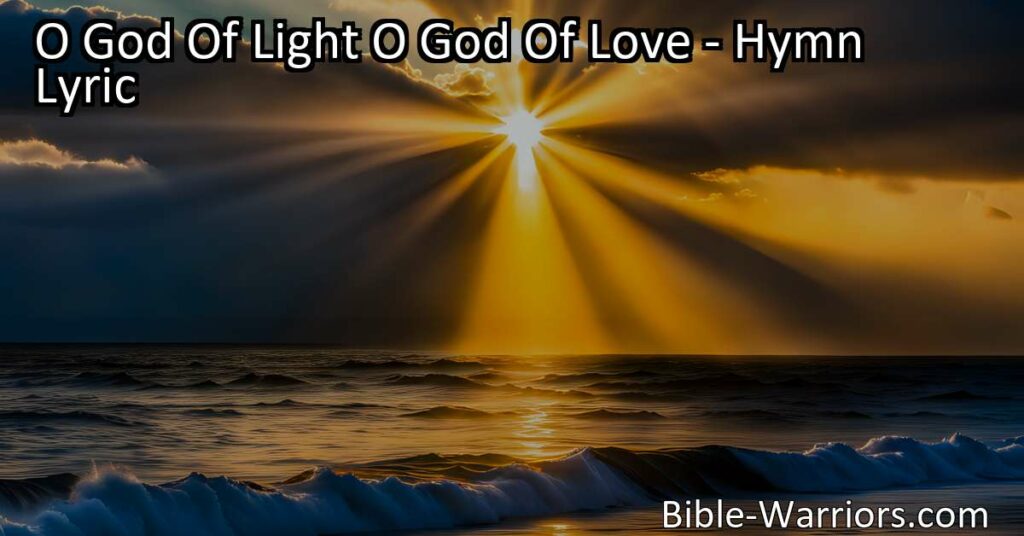O God Of Light O God Of Love – Hymn Lyric
In this heartfelt prayer, the writer calls upon God to shine His light and love upon their soul. They ask for God’s perfect love to reveal their sins and guide them towards righteousness. The writer longs for their heart to be transformed and for their will to surrender to God’s will.
Table of Contents
O God Of Light O God Of Love – Hymn Lyric
O God of light, O God of love,
Shine on my soul from Heaven above!
Let sin appear in thy pure ray
As black as on the judgment day;
Let perfect love apply the test,
And all that’s wrong make manifest.
O take thy plummet and thy line,
Apply them to this heart of mine,
And thus reveal each crooked place
By contrast with true righteousness!
Let holy truth condemn each sham;
Show what thou art, and what I am.
O smite and spare not, faithful God!
A Father’s hand still holds the rod;
O make my sin-stained conscience smart,
And write thy law upon my heart
So plainly, that my will shall bow
In full surrender, here and now!
Work on in me thy perfect will,
In me thy promise, Lord, fulfil;
O make me quick to fight for thee,
And set my soul at liberty!
My soul can rest in nothing less
Than in a spotless holiness.
Meaning of O God Of Light O God Of Love
When we sing the hymn “O God of Light, O God of Love,” we are calling upon a presence that is both illuminating and nurturing. This hymn can be a source of inspiration and reflection, helping us understand our own hearts and the powerful love that guides us from above.
The verses of this hymn are a plea for enlightenment and the strength to face our own flaws. When we ask “O God of light, O God of love, Shine on my soul from Heaven above,” we’re looking for guidance and wisdom. It’s like we’re asking for a ray of sunshine to clear up the confusion and shadows in our hearts.
“Let sin appear in thy pure ray as black as on the judgment day.” This line is a brave request for honesty. The singer wants to see their mistakes and wrongdoings in the clear, uncompromising light of dayjust as they might appear in front of a fair judge who sees everything. It’s about facing the truth, even when it’s uncomfortable or hard.
The hymn speaks about love performing a test, showing us what’s right and wrong within us, almost like a teacher using a bright red pen to mark up a paper. The imagery of a “plummet and line” is a metaphor for God’s judgment and measurement of our actions and intentions. In olden times, builders would use these tools to make sure their work was straight and true. Similarly, we ask for guidance to correct our own mistakes and make our paths straight.
As we ask God to “reveal each crooked place by contrast with true righteousness,” we’re acknowledging that we have faults and areas that need improvement. It’s an opportunity to grow by understanding our imperfections when they’re placed next to what’s truly good and right.
“Let holy truth condemn each sham; show what thou art, and what I am.” This part of the hymn invites a kind of harsh reflection on our own pretenses and the false fronts we might put up. It’s about getting real with who we are and how we compare to the purity of divine truth.
When we plead, “O smite and spare not, faithful God! A Father’s hand still holds the rod,” it’s not about asking for punishment. Instead, it talks about discipline from a place of love, like a parent who guides and corrects a child. It’s about learning from our mistakes and growing stronger and wiser because of that guidance.
The hymn then moves into a very personal space: “O make my sin-stained conscience smart, and write thy law upon my heart.” It asks for a conscience that really feels the weight of wrong deeds, and for a heart that’s so aligned with goodness that doing right becomes a part of who we are.
Asking for God’s will to be worked within us, to fulfil His promise, is a way of seeking purpose and direction. “O make me quick to fight for thee, and set my soul at liberty!” suggests a desire not just to follow the rules, but to actively champion the cause of goodness, and in doing so, find a deep and profound freedom.
Finally, the hymn ends on a note of rest and peace, but not just any restrest that comes from achieving “a spotless holiness.” It’s a high goal, almost impossibly high, but in reaching for it, we’re lifted up and can find true comfort and satisfaction.
“O God of Light, O God of Love” is a beautiful blending of yearning for guidance and an honest reflection. It encourages us to see ourselves in a truthful light, to face our wrongdoings, and to embrace the discipline that comes from a higher love.
This hymn isn’t just a song; it’s a journey from self-examination to self-improvement, highlighting the ideal of living a life aligned with what is just, pure, and loving. It reminds us that while we’re all flawed, we’re also under the watchful eyes of a love that guides, corrects, and perfects.
Just like an artist uses light and shadow to create a stunning painting, the “O God of Light, O God of Love” hymn uses the contrast of our imperfections with divine perfection to shape us. We grow through challenges, reflections, and having the courage to change what we can in ourselves. This hymn provides a blueprint for that growth, asking for illumination, honesty, discipline, and ultimately, a peaceful heart that rests in purity and love. It captures a timeless journey of the soul seeking to be better, to be brighter, to be more loving, and to reflect the light and love of the heavens above.
I hope this hymn inspired image brings you hope and peace. Share it with someone who needs it today!



